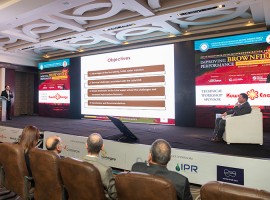An In-depth Look at the Quality and Structures of the Egyptian Oil & Gas University Programs
By Nataša Kubíková
Oil and gas industry experts, businessmen, government officials, and academics often disagree when it comes to discussing the quality and suitability of the existing university education programs for the sector.
Concern in focus is how well the programs are structured to meet the needs of the industry. Their perspectives on the subject matter necessarily differ. According to some, petroleum engineering programs generate highly skilled graduates, whereas others claim that the theoretical knowledge that students gain hardly suffices to meet the requirements on sites.
What they all share, nonetheless, is a common objective to enhance the industry’s output. With this goal in mind, they are trying to modify the higher education system in the petroleum engineering in such a way as to better satisfy industry’s demand.
Promoting STEM-Based Studies
Research degrees in science, technology, engineering, and mathematics (STEM) are generally seen as less desired by young people when they are choosing from among all possible career options. In order to increase the number of those who would be enticed to undertake STEM-based studies some suggest that it is important to include a stronger foundation for it within the education systems. Training Magazine quoted one such expert, Jim Spohrer, Director of IBM Global University Programs, who explained that “STEM skills need to play a bigger role in our curriculum at all grade levels.”
Education trends in the Middle East seem to be following this global direction in that universities see lower number of candidates within STEM studies. There is much left to be done in that regard. Students should be encouraged more to consider STEM-oriented career paths. The training of young people for promising careers in the oil and gas industry is essential for the countries in the region, given their economies’ dependence on hydrocarbon production. The pressure is building up to impact on both the quantity of energy professionals that universities produce and necessarily the quality of the education system itself.
Some Gulf countries currently record a substantial shortage of workers in the industry who would possess technical or vocational qualifications in the electrical, production processes, mechanical, pipe-fitting, drilling operations, and plant construction, noted Sean Price, Head of Direct Delivery at Pearson Education, the world’s largest learning company, already in 2014. The challenge remains to tackle the lack of educational institutions that would provide qualifications in these focused skill sets, according to Price.
This is critical in light of “the wide-held view of both the industry and independent analysts that there will be a rise in the number of workers needed in the hydrocarbon sector over the coming decade and beyond. This is in part due to an increase in demand for oil and gas, as well as a rise in the number of conventional and non-conventional energy fields being developed, all around the world,” Price explained citing world renowned analyses by multinational oil and gas consultancy firms.
It is therefore paramount for oil and gas producing countries to attend to this dilemma and introduce appropriate improvements in the energy-focused university programs.
STEM-related fields such as petroleum engineering are dynamic, which is another reason why high quality university education is crucial to establish a foundation for future oil and gas experts. What is more, this academic field proved demanding even in the post-university period. Hence, even when the number of students in related subjects increases, curricula get expanded and updated, there will be a continuous pressure on STEM university students, graduates, and even professionals to keep up with the technological developments. Spohrer added to that account that “professionals must make continuing education opportunities a priority to stay informed on the latest technical advances.” And this is relevant to all industry professionals.
The State of Petroleum Engineering Education
Unlike some countries in the Middle East, Egypt has been renowned for the excellence of petroleum engineering university programs, which promise to boost capacities for the key energy sector.
“Egypt has about 29 governmental universities and 39 private universities. Most of them offer B.Sc., M.Sc., and PhD Degrees in several engineering disciplines such as Petroleum Engineering, Chemical Engineering, Mechanical Engineering, Electrical Engineering, and Civil Engineering,” Professor at the Petroleum Engineering Department, Faculty of Engineering, Cairo University (CU), Mahmoud Abu El Ela, outlined in an email interview with Egypt Oil&Gas. It is no surprise that the expectations are higher within the sector in Egypt when it comes to the quality of oil and gas human capital.
Currently, three governmental universities, each with more than 50 years of practice, generate graduates in Petroleum Engineering up to the PhD level – Cairo University, Suez Canal University, and Al-Azhar University. In addition, three private universities – American University in Cairo (AUC), British University in Egypt (BUE), and Future University, with some 10 years of experience, provide B.Sc. Degrees in the subject, Prof. Abu El Ela explained.
“As the Egyptian universities teach sciences and theories of different engineering disciplines; Electrical, Mechanical, and Civil, the graduates from these programs can provide support in the design and operations of the surface facilities in the oil and gas fields.”
There are other engineering programs directly related to the industry. “Cairo University, Suez Canal University, and Alexandria University generate Chemical Engineers and Refining/Petrochemical Engineers who have the capabilities to design and operate the downstream facilities and plants in the oil and gas industry in Egypt and in the Middle East,” further stated Prof. Abu El Ela.
Egyptian Universities’ Dynamics
The foundation for the Egyptian oil and gas industry thus appears to be well rooted in terms of structures and diversity of specializations. Some experts and practitioners, however, seem to disagree on the point that the quality of the Egyptian education programs for the industry is sufficient.
According to Eng. Shehab Ali Abouel Kasem, Senior Petroleum Engineer at Agiba Petroleum Company, who spoke to Egypt Oil&Gas, there exists a gap between the requirements by the industry and the content of the university programs. “The scientific content at some engineering colleges is far away from the real field needs,” he said, as students are allegedly taught about the 1970s technologies that have long been outdated.
Academics from Cairo University, however, elaborately counter this argument showing that the design of programs is dynamic reflecting on the development in the industry. “The curricula in the Petroleum Engineering Department at Cairo University are continuously reviewed by the teaching staff to make sure that all topics are covered and updated,” clearly and decisively stated Prof. Abu El Ela. Similarly, his academic colleague, Dr. Mohamed Elahmady, Associate Professor of Practice at the Department of Petroleum and Energy Engineering at the American University in Cairo also affirmed to Egypt Oil&Gas in an interview in New Cairo that AUC adopts most recent curricula and “graduates from the Petroleum Engineering Faculty gain advanced theoretical skills for their future careers.”
Nonetheless, both academics agree that the universities still face a challenge to strike a balance between theoretical knowledge and practical skills. And there are, no doubt, other aspects of university education, which raise further questions.
When it comes to the theory vs. practice conundrum, “a lack of practical experience before graduating from master degrees still needs a lot of room for improvement,” stressed Dr. Elahmady. Linking theories to practice is thus of a paramount concern, equally for the public sector in Egypt as for the private one, because this gap can have extensive implications for the advancement of the Egyptian oil and gas industry as a whole.
Having recognized the need to bridge this gap, Dr. Elahmady chose to tackle this challenge and accordingly altered the approach to his teaching commitments. In his courses, among others in Petroleum Economics and Production-Sharing Agreements, Dr. Elahmady adopted a holistic approach. He divided his modules into several tiers in such a way that it allows him to incorporate visiting lecturers from among industry practitioners into his program. Industry executives come to AUC to speak to his students about immediate practicalities and applications of theoretical know-how.
He explained the routine in details: “Through a semester my students get the basic knowledge they need in addition to practical training. I have invited several engineers from different companies who introduced their work in the field from their specific angles and expertise. In another class, for instance, a country manager of a foreign company talked to students about his perspective on production-sharing agreements.”
Problem-Solving Direction
As Dr. Elahmady further emphasized, attempts to create such a sustainable connection between practical applications of theoretical understandings should focus, in particular, on “problem solving skills.”
“With an aim to direct the scientific research to solve operational problems in the oil and gas industry, Cairo University has launched new postgraduate engineering programs,” Prof. Mahmoud Abu El Ela said. The university thus aspires to project a future that goes even further beyond the objective of linking theories to the applications of new technologies in the oil and gas industry. Key to such an ambition lies in a multidisciplinary approach.
Professor Abu El Ela elaborated on the point saying: “The main challenge is to have postgraduate engineers with multidisciplinary knowledge. The Petroleum Engineering Department at Cairo University has successfully launched two such new professional and multidisciplinary programs under the Mining Studies and Research Center (MSRC). The first one is Natural Gas Engineering Diploma, and another is M.Sc. in Natural Gas Technology.” This shows that Egypt’s education structures in petroleum engineering field respond actively to the development in the country’s hydrocarbon industry and keep up with dynamic and shifting trends.
This multidisciplinary initiative came also as a result of an effective protocol and cooperation between Cairo University, MSRC at the Faculty of Engineering, and the Ministry of Petroleum, along with oil and gas operating companies and organizations in Egypt such as EGAS, EGPC, GANOPE and others, which suggests that the inter-sectional collaboration in the country can generate further benefits.
Professor Abu El Ela noted that “in general, the relationship between the universities and the oil and gas industry is excellent when it comes to the teaching staff at the CU’s Petroleum Engineering Department. Many of them have practical industry experience and are still active in continuing education work and training as well as in industry consulting in cooperation with local and regional oil and gas companies.”
Inter-Sectoral Cooperation
The cooperation between the higher education and industry entities could, however, benefit from more effective and more efficient patterns. As Dr. Elahmady put it, “there should be a much broader reach-out from the faculties to the industry and the other way round,” which would improve the environment on both sides to the degree that Egypt would be able to retain its oil and gas trained work force and prevent recently recorded ‘brain-drain’ scenarios.
With his extensive consulting experience in this area, Dr. Elahmady further insisted that this objective can be achieved through closer education/training cooperation between universities, foreign companies, and the three national umbrella entities – the Egyptian General Petroleum Corporation (EGPC), Egyptian Natural Gas Holding Company (EGAS), and GANOPE.
“We need to have an overarching image of staff, whether it is training within the industry or academic production for the industry, in order to replace the current system of rather disintegrated channels of cooperation among individual companies. Instead, we should merge these elements together under the leadership of the Egyptian governmental authorities.”
The universities would thus benefit better from a direction that these authorities would provide them with based on their assessment of available data on all companies present in the market. Dr. Elahmady believes that “through this holistic approach, EGAS, EGPC, and GANOPE, as the key stakeholders, possess soft power needed to efficiently channel all present efforts of universities, students, foreign oil companies, service companies etc.”
Under the tutelage of the governmental entities, “the universities will be able to establish a bottom-up approach and through these ‘baby steps’ such as conducting a series of pilot projects with their students, they will contribute to expanding the education system with additional seminars followed up with practically oriented workshops with industry practitioners,” Dr. El Ahmday convincingly described a viable proposition.
In order for this idea to become a reality the three entities should “tap into their leverage that would enable to design a framework under their mandate to ensure a proper implementation of an apt university education system for the industry as a whole,” AUC’s expert elaborated. He sees this as an opportunity to enroot consistency into the schemes.
In light of that, on his side, Eng. Mohamed Badr, Oil and Gas Skills’ (OGS) Chairman noted to Egypt Oil&Gas that some of these governmental entities are following the suit. “OGS offers training programs to university students, which motivates the pre-graduates to attend these courses on their own to gain experiences that will help them find employment.”
Cooperation of all involved parties, most importantly from the private sector in Egypt, can help the universities to further improve in other areas as well. At this point, larger contribution is requested from the private firms and foreign investors. Professor Abu El Ela told Egypt Oil&Gas that for instance “at Cairo University the laboratories need to be improved by adding funds and sponsorships from the oil and gas companies.”
On the other hand, Dr. Elahmady from AUC noted that “their faculty has excellent labs, better facilitations, and extracurricular activities for students, additional projects, soft skills training, and a good environment to help excellent graduates to succeed.” Yet, in this case, as he put it, “foreign companies can dig into their large human and capital resources to further Egyptian university production.”
Prospect for Skills Development
“The Egyptian universities supply the local petroleum industry with about 400 national and specialized petroleum engineers every year,” Cairo University’s Professor Abu El Ela stated clearly. “The qualified graduates from engineering disciplines can provide the required support in the subsurface activities of the oil and gas industry in Egypt and in the Middle East as they have appropriate capabilities, background, knowledge, and skills to work in the operating and service companies.”
However, AUC Professor further added that “the skills of the graduates can be improved further by extending the duration of their practical training at the operating companies, which will improve the performance of the graduates and will ensure that the graduates are able to link the theories with the applications of the new technologies to the highest professional standards.”
While some experts believe that currently there is no staff/skills shortage in the Egyptian oil and gas industry, a constant urge to assess the changes within and to project such an education system that would guarantee a pool of diverse talents remains. Experts advocate for a flexible way to modify the structures for the hydrocarbon companies’ interests not only for present needs, but also for the future.








